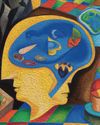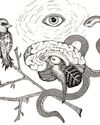
There are many ideas around love, and much has been said on the subject. What I wish us to briefly meditate upon here, is the idea of love as something inexplicable or unreasonable.
I suggested to a friend a while back that he didn’t need to be somebody else in order to be loved by the girl whom he adored, because the reasons why he loves her, and the reasons why she may (or may not) love him, are equally inexplicable. Sure, one can list the things that one likes (or loves) about someone: her intelligent eyebrows, a lonesome grey tooth, a piercing intellect, a lightning-like voice… But, is this why I love my beloved; or am I simply describing things I love about my beloved, with the reason why I love her still being unexplained? Accordingly, I argued that there is nothing one can do to be loved by a specific person. One is who one is, and one hopes for the best – that one is loved inexplicably, without reason, simply for who one is (which may not always be reducible to what one is).
But is this correct? Or, do I definitively recognize why I love the one whom I love? And what is it to love for no reason at all; what sense can be made of that philosophically?
Let me offer a suggestion by way of Immanuel Kant’s theory of pure aesthetic judgment.
Kant’s idea of the Pure Aesthetic Judgment
Bu hikaye Philosophy Now dergisinin April / May 2024 sayısından alınmıştır.
Start your 7-day Magzter GOLD free trial to access thousands of curated premium stories, and 9,000+ magazines and newspapers.
Already a subscriber ? Giriş Yap
Bu hikaye Philosophy Now dergisinin April / May 2024 sayısından alınmıştır.
Start your 7-day Magzter GOLD free trial to access thousands of curated premium stories, and 9,000+ magazines and newspapers.
Already a subscriber? Giriş Yap

Anselm (1033-1109)
Martin Jenkins recalls the being of the creator of the ontological argument.

Is Brillo Box an Illustration?
Thomas E. Wartenberg uses Warhol's work to illustrate his theory of illustration.

Why is Freedom So Important To Us?
John Shand explains why free will is basic to humanity.

The Funnel of Righteousness
Peter Worley tells us how to be right, righter, rightest.

We're as Smart as the Universe Gets
James Miles argues, among other things, that E.T. will be like Kim Kardashian, and that the real threat of advanced AI has been misunderstood.

Managing the Mind
Roger Haines contemplates how we consciously manage our minds.

lain McGilchrist's Naturalized Metaphysics
Rogério Severo looks at the brain to see the world anew.

Love & Metaphysics
Peter Graarup Westergaard explains why love is never just physical, with the aid of Donald Davidson's anomalous monism.

Mary Leaves Her Room
Nigel Hems asks, does Mary see colours differently outside her room?

From Birds To Brains
Jonathan Moens considers whether emergence can explain minds from brains.